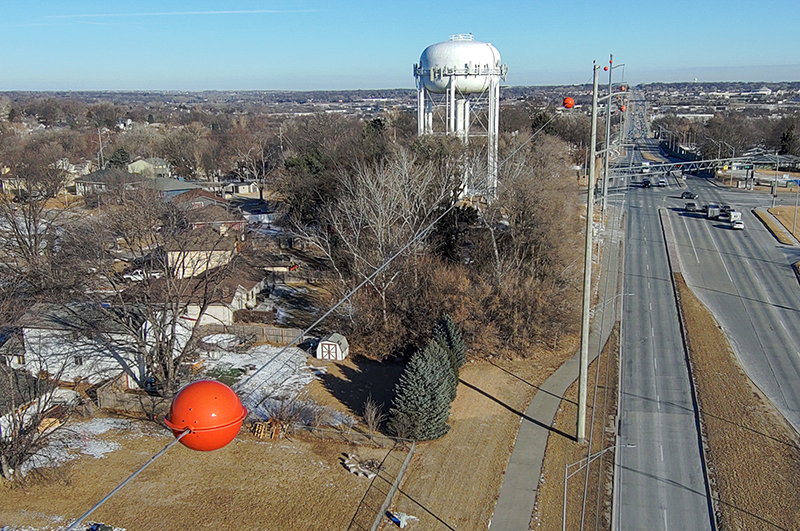
Ever wonder what those bright red balls are doing on OPPD’s power lines?
The answer – warning aircraft to steer clear – is one of many steps the utility takes to ensure a safe distance between its transmission lines and low-flying planes and helicopters.
Every day in Nebraska, planes swoop low to land, spray crops or perform other work. Even the smallest country airports generally see a few takeoffs each day. While pilots are ultimately responsible for avoiding obstacles, OPPD has worked proactively for years to help minimize any collision risk.

Some airspace safety precautions are obvious, like the 3-foot-wide marker balls on wires and bright lights on towers that serve as a visual cue for passing aircraft. The FAA generally requires them in the vicinity of airports, but OPPD also places them on lines over rivers, where planes will occasionally make low passes, and near hospitals with helipads.
“The more we can do to highlight those crossings, the better it is in terms of safety for everybody,” said Shane Hanson, OPPD’s manager of transmission engineering.
Hanson said OPPD also works behind the scenes with federal regulators and local airport authorities to ensure adequate clearance and warnings on aviation maps.
Working together on airspace safety
When OPPD plans a new transmission line, the utility notifies the Federal Aviation Administration, which compiles information nationally for pilots. OPPD lists the height of every structure and its elevation above sea level, along with other information, and the FAA provides guidance on whether lights or other safety measures are necessary.
One recent instance was a new transmission line in Sarpy County, not far from the Millard Airport. Even though the line was a few miles away, Hanson said the project was big enough that OPPD contacted airport authorities to ensure they weren’t planning any expansion that could change the glide path for landing planes.
Power plants are another obstacle, and anything taller than 199 feet must have red and white paint and blinking lights.
In a statement, the FAA said it works with utilities such as OPPD to ensure public safety and has created a website (https://oeaaa.faa.gov/oeaaa/external/portal.jsp) that lets contractors notify the agency about new towers and other potential obstructions.
“The FAA oversees safety in the nation’s airspace, but it is a joint responsibility,” the agency said in its statement. “We appreciate the opportunity to work with public utilities to ensure pilots know of potential hazards.”
Staying aware of infrastructure
Crashes involving OPPD power lines are rare, but aircraft have struck the utility’s equipment a few times in recent years. In one case, a crop duster tried to fly under transmission lines and accidentally ripped off the top part of his cockpit. In another, a pilot struck some lines while trying to land for a medical emergency. And in July, a helicopter was forced to land in a Saunders County corn field after striking a power line, according to the FAA’s accident investigations database.
A big part of promoting safety is public education, with occasional reminders about the presence of power lines for anyone who might come close to them, such as farmers in large combines.
“We work with folks to make sure they’re paying attention to the infrastructure around them,” Hanson said.

Grant Schulte joined OPPD as a content generalist in 2022. He is a former reporter for The Associated Press, where he covered the Nebraska Legislature, state politics and other news for a global audience. He is a graduate of the University of Iowa and a proud Hawkeye. In his free time he enjoys running, reading, spending time with his wife, and all things aviation.
View all posts by Grant Schulte >







